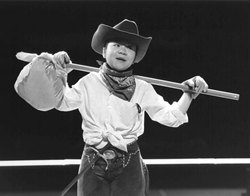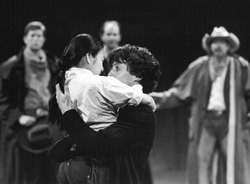|
Seattle 3/14&30/2001 |
Getting the chance to see a fully mounted professional production
of Cymbeline was once a rare event. But here less than
a year after Shakespeare
Santa Cruz's effort comes another opportunity to witness
what a director can make of this crazy-quilt hodge podge of
a play, with its plenteous echoes of nearly every major moment
Shakespeare ever wrote, thrown into plot so convoluted that
only the even less known Pericles can hope to match
it—though even Pericles can't approach the thrilling
concentration of recognitions Cymbeline packs into
its final scene. The romances are truly coming into their
own at the turn of the new millennium—a very welcome
turn of events, as far as I'm concerned.
an attractive venue
The current production is at Seattle's Intiman Theatre, the
Seattle Rep's younger and less well-endowed—if no less
professional—sister, which performs in the building the
Rep used to inhabit before it built a new home across the
street. Clued into my presence in town by her colleague at
the Rep—or by the review of its A Midsummer Night's
Dream posted here—the Intiman's engaging Communications
Director Stephanie Coen emailed an invitation to attend—and
I and my companion were only too happy to oblige.
This Cymbeline is also a coming-out party of sorts for the
new Artistic Director Bart Sher, who arrived too late to put
much of a mark on the Intiman season last year. This year
he's out of the blocks early, making Cymbeline—which
Sher last directed at the 1998 Idaho Shakespeare Festival,
successfully enough to attract the attention of several Intiman
Board members—the first play of the 2001 season and his
own Seattle directorial debut.
costumes drama
The result is a promising if incompletely jelled effort that
mixes several culturally and historically disparate styles
of staging—Japanese Kabuki, Peking Opera, singing cowboy
Western, bare-stage absurdist, Alice-in-Wonderland psychedelic,
traditional Renaissance, and several others—to no very
apparent end. This Cymbeline is like a costume drama—just
with six or seven different styles of costume (hats off to
Costume Designer Elizabeth Caitlin Ward).
Each concept had its moments, and some—in particular
the singing cowboy one—gathered enough steam to generate
exciting effects. But an overall vision to organize and in
the darkness bind them to some larger goal never quite materialized,
leaving us to wonder what precisely was Sher's point—other
than to present a portfolio of the kind effects he's capable
of producing.
Given the lack of a convincingly unifying vision, it's probably
best to take each concept separately, focusing on what worked
well and could perhaps have figured in a better, more organized
production.
asia
Cymbeline and his daughter Imogen are drawn from an Asian
theatrical tradition—whether Kabuki or Peking opera,
considering the lack of development given to the appropriation,
is probably immaterial. This choice fits well with the casting
of the diminutive Julyana Soelistyo—who originated the
title role of David Henry Hwang's Golden Child, for
which she was nominated for a Tony after it reached Broadway—as
Imogen.

Julyana Soelistyo as Imogen. Photo
by Chris Bennion.
I was afraid at first that her size and slightly accented
English might get in the way of her performance—but Soelistyo's
large talent, combined with a spectacular karate-kick to Iachimo's
face and the sheer physical comedy of her hugging reunion
with her much taller brothers, had won me over by evening's
end. Plus—she looked so cute when, disguised as Fidele,
she switched to chaps!
One unfortunate consequence of the Asian concept: Cymbeline
feels it appropriate to strike his daughter when she angers
him at one point early in the play—which spoils the shock
of Posthumus's similar gesture towards the end. But Imogen
and Pisanio's flight to Wales—a tableau of parasols against
the driven snow drawn straight out of a Hiroshige woodblock—almost
made up for it.
alice
Imogen's opponents the Queen and her son Cloten were from
a completely different, Alice-in-Wonderland world—or
something like the Laugh In world of last year's Santa Cruz
production.
Cloten was at his most effective when he rode a kind of hobby
horse around—especially at the end of the final scene,
as an amusingly headless horseman in the background. Joe Conley
Golden does yeoman's service in this thankless role. Anne
Allgood as the Queen does a fine job of conveying her two-faced
manipulation of those around her—except when she goes
a little overboard with vituperation.
Jonathan Epstein as Iachimo stuck to more traditional Renaissance
costume—which suited his delicious Machiavellian schemer
nicely. Epstein was a master at telegraphing the intelligence
behind the twists and turns of Iachimo's scheming, the sprezzatura
of his every ploy and posturing entirely manifest. Unfortunately,
his speeches did sometimes have a tendency to get a little
caught in his throat.
autry
What worked best of all was the cowboy concept Sher uses
to bring the hills of Wales alive—with the sound of music!
You'd be surprised how well a Western accent can convey the
emotion behind the Welsh contingent's lines—while also
fostering the amusement and emotional detachment (on the audience's
part) needed for them to have their full effect (on this effect,
see my review
of the Santa Cruz production). Dan Peterson played Belarius
as Slim Pickens reincarnated, with David Gehrman as Guiderius
and Alban Dennis as Arviragus no slouches in the torch and
twang department either.
|
 Julyana with Jason Cottle as Posthumus.
David Gehrman, Alban Dennis, and Dan Peterson in background.
Photo by Chris Bennion.
Julyana with Jason Cottle as Posthumus.
David Gehrman, Alban Dennis, and Dan Peterson in background.
Photo by Chris Bennion. Sher does go a little over the top with the quirky cowboy
song that ends the first half, and the "Love is in the
Air" that ends the second upstages Cymbeline's famous
last words of reconciliation ("Let a Roman and a British
ensign wave friendly together"). "Stand by Your
Man" plays over the PA system on the way out the door,
completing the thematically appropriate trio. Still, these
moments of tuneful lunacy were truly the highnotes of the
night.
the bad and the ugly
What didn't work? Well, the annoying wooden clappers that
an onstage musician sounded too loudly every time Sher wanted
to make sure the audience was paying attention, for starters.
The bare red stage with a shower curtain drawn across it for
purposes of discovery, which just looked cheap and ugly. The
acoustics of this bare stage, which muffled the voices of
the actors in the unfinished concrete of the distant coulisses.
The lighting, which was mostly an unrelieved blaring white
of most every light in the place. The attenuation of mid-line
caesuras and extension of end-of-line pauses, which lent a
stumbling cadence to many a speech. The elimination of every
ghost of Posthumus's family except his Miss Haversham-like
mother, completely skewing Jupiter's descent. And the weirdly
omniscient "storyteller" presences costumed á
la Mark Twain, who took over not only the First and Second
Gentlemen's parts, but also Cornelius the physician, Jupiter,
Philario, probably other roles, in a fashion more confusing
than illuminating—Sher is no Robert Wilson, after all.
redemption
But the beauty of Cymbeline is that nothing—in
my experience so far at least—can destroy the pleasures
of the final recognition scene. No matter how many times you've
seen or read it, you can't help but marvel at how Shakespeare
ties up all the loose ends of plot and socio-political alienation
here, in a resolution as wholly improbable as it remains intensely,
emotionally satisfying: I guess we'd all love to wake up and
find our world so much more intimately interrelated than we've
any right to expect.
And if the several completely disjoint production concepts
Sher puts in play here have any excuse, it's likely to be
their contribution to our sense of wonder that all these people
turn out to be closely related when the manifold ways they've
touched each other's lives are finally revealed—even
if these concepts have precious little intrinsic justification
for coming together.
So I guess when all is said and done this Cymbeline does
kinda work, as Sher seems (based on the press release) to
have intended it, as an allegory of multiculturalism in the
theater—though with all the weakness inherent in such
a loose form of cultural togetherness.
my riff
What I personally would rather have seen, would be for Sher
to have parsed his different cultural vocabularies out amongst
a bevy of more focused productions—if only to give each
tradition a star turn of its own—and dedicated his Cymbeline
to the one that works best here: the Western one. Then if
he wanted to do something truly political—why not explore
and reconcile the differences within that culture by
allegorizing contemporary political events—as Shakespeare
himself seems to have done with the Jacobean project of Union
in penning this play.
Just imagine: what if Cloten began the allegory by appearing
more and more clearly as a species of George W. Bush impersonator,
following his early rhetorical faux pas with an impassioned
speech in favor of giving the British a tax cut. His mother
the Queen might then start to channel Lynne Cheney, imagining
her husband's demise and her own political ascendancy not
only in
a novel, but in the strategies she brings to actual events.
Cymbeline could become Cheney himself, or better (though not
quite as Western) his ally William Rehnquist, kingmaker of
the Dubya to be. Though more Country than Western, who better
for Iachimo than our suave former lothario-in-chief Bill Clinton,
threatening God-bless-America Imogen with his inimitably seductive
ways—Stand
by Your Man indeed. Reagan'd have to figure in here too—an
actual ex-cowboy actor become ex-President could hardly be
omitted. Maybe the ghost of Posthumus's father would serve
his turn: "Happy Trails toooo Yooooou…"
Now that's the kind of Cymbeline I could really get
behind at the turn of the present millennium. Sher's already
half way there in this production. For the rest—I look
forward to many promising Intiman productions to come from
an Artistic Director of a range as wide and skill as promising
as this.
As for other Shakespeare fans out there, this Cymbeline
is definitely worth taking in if you live in Seattle, or are
already planning a trip here for some other reason. If not,
well, Sher's Intiman isn't really worth a special trip—yet.
But it'll be very interesting to see what develops.
3/30 update
My companion and I returned to give this Cymbeline
another chance a couple of weeks later, having in the meantime
purchased a subscription for the entire season—on happy
hour night no less, when playgoers congregate an hour or two
early for complimentary cakes and ale (for Cymbeline
courtesy the new W Hotel's restaurant and Hale's Ales).
Not only were we more relaxed, but several of the actors
seemed to have settled nicely into their roles as well. Anne
Allgood was even better as the Queen, Jonathan Epstein schemed
even more suavely as Iachimo, and Jason Cottle, whom I didn't
find a chance to mention before, could have been Hugh Grant's
more athletic twin brother as the Posthumus Leonatus of the
battle scenes. Only Julyana Soelisty, alas, was having an
off night as Imogen, seeming hesitant and chirpy in the role.
But in the main, a second sitting served to confirm my previous
judgments of the production. The play dragged even more until
we were home on the range in Wales at last just before intermission.
This time the cowboy interludes were welcome from the first,
where before they seemed downright peculiar until we'd become
better acquainted. A couple of weeks had also improved the
comic timing of the final scene, now become a thing of power
as it deserves.
|




